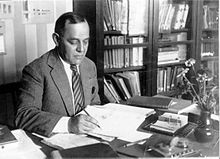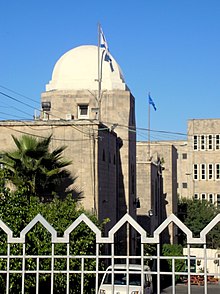Arthur Biram
Arthur Jitzchak Biram ( Hebrew ארתור יצחק בירם; born August 13, 1878 in Bischofswerda , German Empire ; died June 5, 1967 in Haifa , Israel ) was an Israeli philosopher , philologist and educator . He founded the Reali School (" Reali School ") in Haifa and was its first director.
Life
Arthur Biram was born in 1878 in Bischofswerda, Saxony , as the son of the textile merchant Adolph Biram and Eva, born. Born in Neufeld. At the age of seven he moved with his family to Dresden , where he attended the community school and the Kreuzgymnasium under Heinrich Stürenburg . From the Obertertia in 1893 he became a student of a humanistic high school in Hirschberg in Lower Silesia . After graduating from high school in 1897, he studied classical and Semitic languages and philosophy at the University of Berlin with Eduard Sachau , Friedrich Delitzsch , August Fischer , Georg Simmel , Friedrich Paulsen , Ulrich von Wilamowitz-Moellendorff and Eduard Meyer . His Arabic written dissertation from 1902 for obtaining the doctoral degree at the University of Leipzig bears the translated title The atomistic substance lesson from the Book of disputes between Basrensern and Baghdad Ensern , deals with the mutazilistischen scholar Abu-Rashid an-Nīsābūrī of Basra from the 11 Century and was published in the same year by Brill in Leiden . In 1904 he graduated from the College for the Science of Judaism and then became a teacher of language and literature at the Berlin Grammar School for the Gray Monastery . He became a supporter of Zionism and together with Theodor Zlocisti founded a gymnastics club named after Bar Kochba .
In 1913 he emigrated to what was then Ottoman Palestine . In the same year he founded the Hebrew Reali School in Haifa and became its first director, but in 1914 he had to do military service in the German Army when the First World War broke out and was stationed in Afula . In 1919 he returned to school. During this time he tried to introduce the reform pedagogical principles of Wyneken and Kerschensteiner , but was unsuccessful. With his wife Hanna Tomaszewski, whom he married in 1924 after immigrating to Palestine from Berlin in 1920 , he had two sons, Aharon (1928–1951) and Binjamin, who both died at a young age. After the Hebron massacre , he and Yaakov Dori founded an institute for physical education.
In 1937 Biram initiated a paramilitary training program for students, the Ḥagam (short for unginnukh Gufani Murḥav , extended physical training ). The Gadna later emerged from the Ḥagam .
“The idea for the program was initially created at the Reali School in Haifa on the initiative of the headmaster, Dr. Arthur Biram. The unrest of 1936 led to an expansion of activities. In 1937, Hagam education became compulsory for girls in the upper grades (until then, only boys had to attend). For the boys, compulsory classes in field exercises and other forms of defensive sports have been added. Male and female students from the Reali school took part in the guard duty, looked after the wounded and helped with the work of firefighters and auxiliary police. With the help of Reali graduate Ya'akov Dori (the Haganah commander in Haifa and, with the establishment of the state, the first chief of staff of the Israeli Defense Forces), the Reali school unit - consisting of male and female students together with their commanders - became a separate train accepted into the Haganah. "
Biram laid the foundation stone with the Ḥagam program for the recruitment of women in and later in the Israel Defense Forces .
In 1943 he founded and directed a teacher training college at Reali High School and in 1953 initiated the establishment of a military academy.
In 1948 he resigned from his position as head of the Reali school, but remained chairman of the board of directors of the school. In 1953, at Biram's suggestion, with the support of Prime Minister David Ben-Gurion, a boarding school was founded next to the Reali School in Haifa to prepare school leavers for an army career . In 1954, Biram was awarded the Israel Prize in Education.
Works
- Kitābu 'l Masā'il fi'l Ḫilāf bejn al-Baṣryjin wa' l Bagdadyjin al-Kalām fi'l Gawāhir ("The atomistic theory of substances from the book of disputes between the Basrens and Baghdads.") Dissertation, University of Leipzig, H. Itzkowski Berlin, 1902 digitized
- Sefer Orbakh: Offered in honor of Dr. Eliyahu Auerbach, on the occasion of his seventieth birthday. Jerusalem, 1955.
- Sefer negro: lizkor D. negro. Jerusalem, 1955.
- Mapot. Haifa, 1961.
- The History of Israel in the Biblical Period in the Framework of Ancient near Eastern History. Journal of Biblical Lit., September 1963, Volume 82, No. 3, p. 365
Individual evidence
- ↑ Uwe Fiedler: He founded a school in Haifa: On the 50th anniversary of Arthur Biram's death.
- ↑ Göttingen University Catalog
- ^ Encyclopedia.com: Arthur Biram
- ^ "Another major source of Haganah recruits was Hagam (an acronym for Expanded Physical Education). The idea for the program first took shape at the Reali School in Haifa, on the initiative of the school's principal, Dr. Arthur Biram. The riots of 1936 prompted an expansion of activities. In 1937 Hagam training became compulsory for girls in the upper grades (until then, only the boys had been required to participate). For the boys, mandatory classes were added in field exercises and other forms of defensive sports. Male and female students at the Reali School took part in guard duty, attended to the wounded and assisted in the work of firemen and auxiliary police. With the help of Reali graduate Ya'akov Dori (the Haganah commander in Haifa and with the establishment of the State the first chief of staff of the Israel Defense Forces), the Reali School unit — consisting of male and female students together with their commanders —Was incorporated as a separate platoon within the Haganah. "
- ↑ Dganit Boni-Davidi: Haganah
literature
- Education up to our days: Arthur Biram and the Reali-Schule , in: Moshe Zimmermann , Yotam Hotam (Ed.): Twice home: the Jeckes between Central Europe and the Middle East , Frankfurt a. M .: Beerenverlag, 2005, pp. 267-279
Web links
- Biographical Lexicon of Upper Lusatia ( Memento from February 11, 2013 in the web archive archive.today )
| personal data | |
|---|---|
| SURNAME | Biram, Arthur |
| ALTERNATIVE NAMES | Biram, Arthur Jitzchak |
| BRIEF DESCRIPTION | German philologist, pedagogue and Jewish theologian |
| DATE OF BIRTH | August 13, 1878 |
| PLACE OF BIRTH | Bischofswerda , German Empire |
| DATE OF DEATH | 5th June 1967 |
| Place of death | Haifa , Israel |

